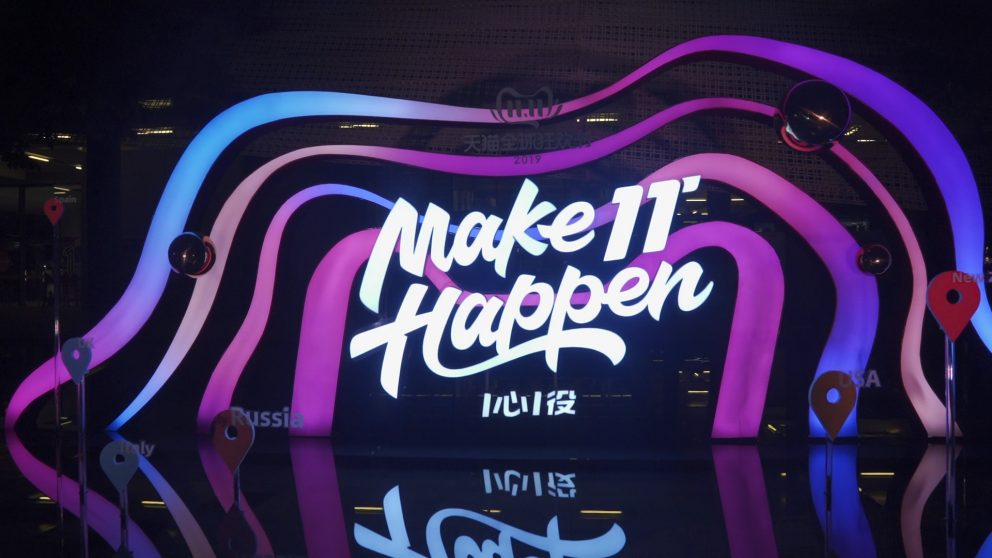The Alibaba Cloud 2021 Double 11 Cloud Services Sale is live now! For a limited time only you can turbocharge your cloud journey with core Alibaba Cloud products available from just $1, while you can win up to $1,111 in cash plus $1,111 in Alibaba Cloud credits in the Number Guessing Contest.

Shopping festivals have become increasingly important in the retail world in recent years, not only as sales drivers but also for brands to boost consumer awareness and engagement as they pave a path to long-term growth. As we enter into a holiday season brimming with shopping festivals, Alizila sat down with David Roth, chairman of BrandZ and CEO of The Store WPP EMEA and Asia, to learn about this increasingly important retail phenomenon and how brands can best leverage shopping festivals to be more successful.
I authored a book called "The History of Retail in 100 Objects", which included the market as a defining item in retail history. The market really was the place where all things shopping festivals came from – it was where buyers and sellers of all sorts of things came together. Some of those markets took place once every month – in a village, or a town. It really was a place that was a festival of all sorts of things, including commerce, entertainment, literature, socializing and even medicine.
Nowadays, shopping festivals appeal to consumers in three dimensions. The first dimension is good deals and discounts. The second really important thing is that they are becoming social occasions – and social occasions nowadays don't necessarily need to be physical. Third, they're also a great way of molding the social aspect together with entertainment. When you pull those three strands together, we can see that more and more consumers are drawn to the ability to be able to get exclusive discounts but also the ability to enjoy things in ways where they can participate with other friends and colleagues. It's not just about shopping, it's also about entertainment.
I don't think you really get a true understanding of 11.11 until you've actually been there on the ground. This sort of fast-paced combination of physical and virtual, entertainment, variety and performance invigorates every single one of the senses. My biggest takeaway was how engaging all of it was and how it really is a mixture of blurring the lines between sales promotion, sales incentives, tremendous entertainment and the fear of missing out. The pre-work that successful brands have to do before a shopping festival to make sure that their brands and their products and their offers are in front of the consumer's mind is tremendous. There's also work that good brands do on the day itself, looking at sales data on a real-time basis and instantly course-correcting so that they maximize that time.
Alibaba's 11.11 differs from other shopping festivals by how communal it is – how engaging the festival is, not with you as an individual but you as a shared experience with your friends, your colleagues and the key opinion leaders that you follow.
The combination of all of those things is the glue that holds 11.11 together in China. I personally think this can work in other countries and markets. If my crystal ball is working effectively, I can see over the course of the next few years that mixture of shared experience, promotion, sales incentives, entertainment and fear of missing out resonating around the world. It will end up being a global phenomenon.
The modern genre of shopping festivals is very much a feature more in China than it is anywhere around the world. The nearest thing to a digital shopping holiday outside of China today is Amazon Prime Day. They have been happening for a few years, but there is a big difference between Amazon Prime Day and the shopping festivals that we see in China.
Occasions such as Amazon Prime Day, Black Friday, Cyber Monday are shopping holidays that focus on discounts, while days like 11.11 and 6.18 in China are shopping festivals where consumers come together to enjoy entertainment and new product launches by brands.
The way in which companies, including some of the biggest brands on the planet, now use 11.11 as a vehicle to launch new products is very different and unique. We tend to think of promotion-based activities for shopping festivals, but to use 11.11 as the biggest vehicle to launch new products – products that have very different customer propositions – is something that is unique to 11.11.
From an international brand's perspective, especially those which have been participating for a while in 11.11, this is probably their most important sales period of the year. They've all been working for months and months – maybe some of them for the past 12 months – particularly in terms of supply chains, the products they are going to launch and the products they are going to be heavily promoting. The ability now is to be able to take real-time data feeds, not just from a global China perspective but also from individual cities, individual streets, and individual towns, to really understand what's going on. This is something that international brands are going to have to learn to deal with. It's very different from a Cyber Monday or a Black Friday, in that respect.
For international brands which haven't participated in 11.11, my advice is to study this hard. It's too big to ignore, and I think it's too big not to participate in. If you're not really participating in this yet, the advice is to use this as the study ground, see what people are doing and how they're doing it. Speak to colleagues and friends in and around China and in the Alibaba ecosystem so that you can start, on Nov. 12, 2020, preparing for what your 11.11 is going to be in 2021.
One of the most important ways of driving business in markets like China is to embrace shopping festivals. Brands like L'Oréal which are already operating locally on a large scale have done that exceptionally well.
The other bucket of brands is those which aren't necessarily localized within the market but have realized shopping festivals provides them with a great opportunity to create a new level of awareness. A very good example of a business that has done that is sustainable footwear brand Allbirds. With insights from Alibaba's platform, it used shopping festivals as an opportunity to find out what product would best fit the market. And then using the excitement, the scale of audience, the unique opportunities that shopping festivals provide, it was able to have a direct dialogue with consumers and turbo charge the brands presence in China.
What unites those two groups of brands and brand owners is that they're not frightened to experiment. That, to me, would be the biggest lesson of all these shopping festivals – they provide you with a unique opportunity to experiment with something different. The most important thing is that you have to engage to be able to participate. The sooner you start to experiment, the better, because the long-term success will result from really understanding what works for you and your brand – and for your consumers. That's not the same as what's going to work for another brand and their products and their consumers. Understanding that is critical.
Shopping festivals, no matter how big they are, have to ensure relevance, or there is no doubt that consumers will walk away. The history of retail is strewn with the corpses of brands and companies that failed to understand what it is the consumers wanted. I don't think shopping festivals in that respect are any different. One of the things that's always struck me about the way Alibaba has gone about 11.11 is that each year there are new and different things which are amazingly engaging in a way that attracts new brands and brings new types of offers and propositions to consumers, including product categories that weren't there last time or enabling different ways for consumers to get access to various different offers.
One area of growth for shopping festivals in their digital format is new technology. More and more consumers are comfortable using technology, both from a payment perspective and also from an information perspective. For example, integrating voice activation and voice payments in a shopping festival or using livestreaming to leverage key opinion leaders. One of the really interesting new developments that we've seen emerge in China, and one which certainly became much more important during the Covid period, is the use of livestreaming in order to engage consumers. It is a really interesting way to demonstrate products, show their advantages and the customer proposition, and then complete the sale – seamlessly all on the same platform.
Making predictions is always very difficult, but especially this year when a lot of the rules right across the world have been completely rewritten. I think I'd be safe in saying that the sales this year will be bigger than 2019. I think that we will see increasing importance of livestreaming. I believe that more sales will be generated purely via voice through the various different voice platforms that are available within the ecosystems.
I think the more shopping festivals that occur – and indeed, we saw in America a new shopping festival which occurred just over the weekend for the very first time – the more consumers are going to start to interrogate what the value propositions of those shopping festivals are. For festivals to thrive and survive when there's more competition, it'll be fundamentally important to ensure that consumers are well aware of them and to make sure that the value proposition of that festival is significantly better than any other festival. What I mean by that value proposition is how authentic the deals are. Then you need to look at the various different ancillary parts that are included in that shopping festival. How do those resonate with what the consumer wants at any particular moment in time? Like anything, it's important that shopping festivals evolve with the changing demands of consumers.

2,598 posts | 769 followers
FollowAlibaba Cloud Community - November 18, 2022
Alibaba Cloud Community - June 14, 2024
Alibaba Clouder - September 15, 2020
Alibaba Cloud Community - July 25, 2022
Alibaba Clouder - November 3, 2020
Alibaba Clouder - March 11, 2019

2,598 posts | 769 followers
Follow Black Friday Cloud Services Sale
Black Friday Cloud Services Sale
Get started on cloud with $1. Start your cloud innovation journey here and now.
Learn More Retail Solution
Retail Solution
Alibaba Cloud enables digital retail transformation to fuel growth and realize an omnichannel customer experience throughout the consumer journey.
Learn MoreMore Posts by Alibaba Clouder
Start building with 50+ products and up to 12 months usage for Elastic Compute Service
Get Started for Free Get Started for Free